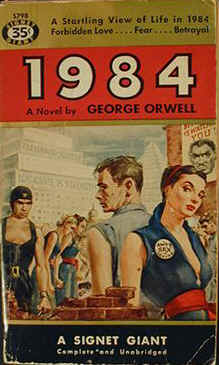I was in Borders today and grabbed the most recent edition of Mother Jones magazine. I was intrigued by a number of the articles listed in the table of contents, but the opening line of Bill McKibben’s piece “Is Corporate Do-Goodery for Real?” was compelling enough to get me to throw down the six bucks necessary to take a copy home. As the father of a soon-to-be two-year-old and a soon-to-be five-year-old, I found the opening paragraph of McKibben’s article terribly alarming but also all too familiar. McKibben writes:
“Ten percent of a two-year-old’s nouns are brand names; by the time an American child heads to school, he or she can recognize hundreds of logos. Disney is now putting its cartoon characters on fresh fruit, arguing (perhaps correctly) that it’s the only way to get kids to eat it. If that’s the world we’re born into, is it any wonder we want corporations to solve our biggest problems as well? Isn’t it a parent’s job to protect us? And besides, who else has the capital and the power to do what needs to be done in the face of a crisis like global warming?”
The whole family thought it was cute the other night when we were driving next to a big mall and our youngest – who, incidentally, is still trying to master the names of everyone in his family – called out “Chuck E. Cheese!” as we drove past the sign that bears the name and likeness of every American kid’s favorite pizza making rat. Cute and terrifying.
But McKibben’s piece is not really about the process of forming children into fully devoted followers of consumer capitalism (for more on that, see Juliet Schor’s insightful and appalling Born to Buy: The Commercialized Child and the New Consumer Culture). McKibben’s article is about asking the question of whether or not we can have confidence in the recent rise of corporations with at least the appearance of a conscience.
At one point in the article McKibben takes a shot at the ultimate big-box juggernaut, Wal-Mart, who recently announced that they would start carrying organic produce:
“Often the difficulty is built right into a company’s business model. It makes scant difference whether Wal-Mart starts stocking organic food or not, because the real problem is the imperative to ship products all over the world, sell them in vast, downtown-destroying complexes, and push prices so low that neither workers nor responsible suppliers can prosper. (In fact, Wal-Mart’s decision to sell organic food will almost certainly mean the final consolidation of the industry into the hands of a few huge growers that ship their produce across thousands of miles—not to mention that the people ringing up the organic groceries will still make below-poverty wages and taxpayers will still be footing the bill for their health care. There’s something gross about buying a healthy carrot from a sick company.)”
Predictably, McKibben doesn’t hold out a lot of hope that the corporate powers-that-be, left to their own devices, will rescue us from our ills. He does offer some hope for us, but it’s a hope that requires us to muster up some political moxie:
“‘Will business save the world?’ turns out to be the wrong question. The right question is “How can we structure the world so that businesses play their part in saving it?” And the answer to that, inevitably, is politics…. The strange part is how little opposition the corporate agenda meets anymore—how many of us have accepted the ideological argument that as long as we leave commerce alone, it will somehow, magically, solve all our problems. We could compel Big Oil to take its windfall profits and build windmills; instead we stand quietly by, as if unfettered plunder were the obvious and necessary course…. In the childlike enchantment we’ve lived under since the Reagan era, we’ve wanted very much to believe that someone else, some wavy-haired ceo, would do the hard, adult work of problem-solving. In fact, corporations are the infants of our society—they know very little except how to grow (though they’re very good at that), and they howl when you set limits. Socializing them is the work of politics. It’s about time we took it up again.”
Socializing kids and corporations... daunting tasks indeed. An interesting article. Worth a read.

